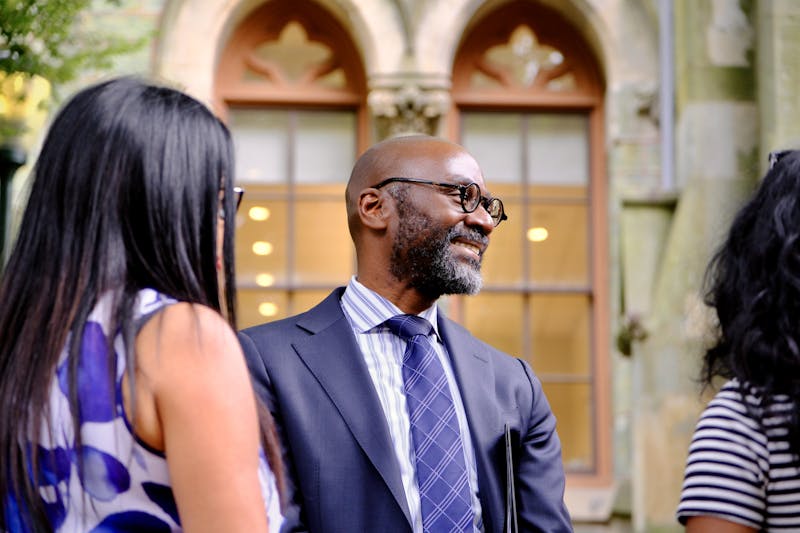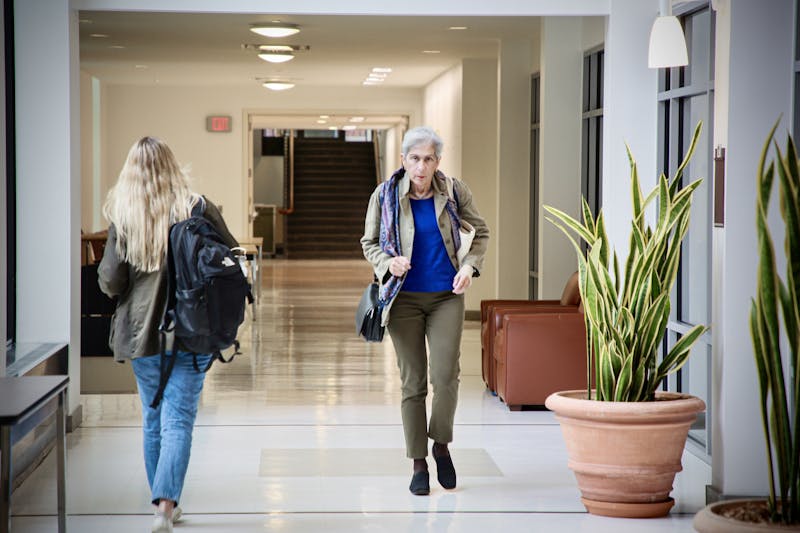
The Daily Pennsylvanian asked students what they thought about On Campus Recruiting, and whether they think the University should be giving more help to students who aren’t pursuing an ‘OCR job.’ Watch the video, and get the full story here.
Credit: Kyle Bryce-BorthwickBeyond the suits, big info sessions and high publicity of the on-campus recruiting season lies another job-hunting culture.
Students seeking jobs that don’t traditionally recruit through OCR sometimes have to work harder to find jobs due to the lesser visibility their job search opportunities have.
Fifty-two percent of the Class of 2011 went into financial services and consulting, according to Career Services. However, there was still a sizeable percentage of students who went into other industries.
These students “have to do the legwork” to reach out through other opportunities, Director of Career Services Patricia Rose said.
This is because companies in non-corporate industries typically do not go to college campuses to actively recruit students.
“The world recruits in different ways,” Rose said. “We help them in many other ways through career days, alumni networks, alumni panels and job listings.”
Nature of the non-corporate
While Career Services supports students through services like resume critiquing and career fairs, some students believe they have to do a lot of the job search independently, unlike the structured process of OCR.
College senior Trisha Sanghavi said, “OCR’s a great option, but at the same time there’s a lot of different employers not represented in OCR.”
Sanghavi, who is looking into pursuing a career in education or children’s media, said, “I do understand it’s not feasible for non-finance, non-consulting companies to recruit on college campuses.”
“It’s not a problem as long as students are willing to be a bit more proactive in reaching out to organizations for programs,” she said.
In addition to being independent, students also have to be comfortable with uncertainty, said Deirdre Martinez, director of the Penn in Washington program. “It’s not a disadvantage — the timing’s different, and it has more uncertainty, but life is going to have some uncertainty, and this is not necessarily a bad thing.”
“It’s more difficult to some extent,” College junior Allison Wattenbarger said. “With OCR, you’re more likely to end up with something. In the humanities, there’s less certainty — it’s a tough field for anybody at any age to get into.” Wattenbarger is planning to go into the humanities, though she’s unsure in which specific field to start her job search.
When it comes to nonprofits, it is simply the nature of the industry to require a different hiring process than OCR. Associate Director of Civic House Elizabeth Milkie said. “More often than not, a for-profit company has the resources to send staff members to Penn to spend entire weeks at a time here actively interviewing and recruiting, which is a resource nonprofits don’t have.”
“Nonprofits may not even have an HR department to do that kind of thing,” Milkie said. “It’s tricky because nonprofits don’t always have the foresight to know what positions are available and how many there are to do recruiting early.”
Students agree that part of the high visibility of OCR could be the big presence of the Wharton pre-professional business brand.
“If you know you want to do banking or finance, Penn is the place for you,” said Phillip Venice, a College senior planning to go into public relations and political campaigning. “The Wharton brand is very powerful here.”
Venice said part of the reason for the difficulty in finding jobs in his area of interest could be Penn’s location. “It’s a complicated picture, and it’s not that I’m having a hard time, it’s just that it would be much easier if I was in D.C. and there were all kinds [of institutions] like senatorial offices recruiting.”
Resources on campus
Students in non-corporate tracks need to travel different avenues. For those interested in the humanities, writing or literature, the Kelly Writers House provides a community to support and mentor students, as well as provide apprenticeship and internship opportunities.
“These companies don’t come to campus at all,” said Al Filreis, faculty director of the Writers House and director of the Center for Programs in Contemporary Writing. “Magazines just don’t do that kind of thing. Students generally have to find their own way when they’re not in fields sponsored by OCR activities.”
The Writers House’s career support is completely independent from Career Services. However, “we’re in constant dialogue with them — they reach out to us and we do joint events with them,” Filreis said.
While Filreis is a big supporter of Career Services and thinks it’s a great resource, he said, “OCR is completely biased in favor of pre-professionalism, and obviously that’s going to be the case, because it’s for large corporations — but it’s very much tilted in the direction of corporate employment and business.”
“It contributes to the feeling to arts and humanities students that they are second-class,” Filreis said. “The main problem is not Career Services … The main problem is in the minds of Penn students, they think Penn can do nothing for me because these careers are not the focus.”
Students interested in nonprofit careers can look to Civic House for resources and guidance. Besides organizing several programs independently, Civic House partners with Career Services to organize job fairs and panels to expose to the available options.
The Penn in Washington program, run by the Fels Institute of Government, is another avenue through which students can look for jobs in government and public policy.
“Getting a job in D.C. works very differently from OCR,” Martinez said. “In Washington, it’s all about networking.”
PIW provides opportunities for students to connect with alumni by setting up informational interviews. “Students get jobs out of that — that’s how you get jobs in D.C. more than any other way,” Martinez said.
Being proactive
Students do believe that while Career Services has been very helpful in many areas of their job search, there are improvements to be made.
“I feel overloaded — the problem is getting to what is most helpful for people like me and trying to sort through all the OCR stuff,” Venice said. “At a certain point, there needs to be more targeting for people not in OCR.”
“They’re doing a pretty good job,” College senior Lisa Doi said. “I feel I’m in a good position because I see a lot of non-OCR type positions being promoted- I feel really supported.”
Ultimately, students in non-OCR careers have to be proactive.
Milkie said a challenge is knowing what students want and how to best provide them resources.
“It’s on Penn students to begin changing attitudes — if they are creative students, right-brained students, they need to be just as proud and aggressive as their colleagues in business fields in seeking jobs,” Filreis said.
“We’re here, but students need to come and work with us so we can help them find those other jobs,” Rose said.
Venice believes that “Penn is a world-class university, and they do a great job in terms of reaching out to communications majors.”
“I don’t feel neglected, it’s just that we wish we had an OCR beyond just those careers,” Venice said. “It’s easier to know what’s going on if you’re doing OCR.”
The Daily Pennsylvanian is an independent, student-run newspaper. Please consider making a donation to support the coverage that shapes the University. Your generosity ensures a future of strong journalism at Penn.
DonatePlease note All comments are eligible for publication in The Daily Pennsylvanian.







